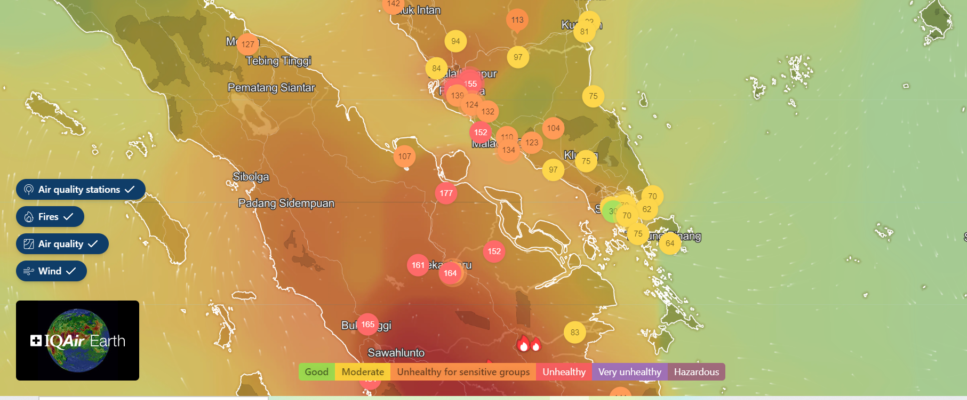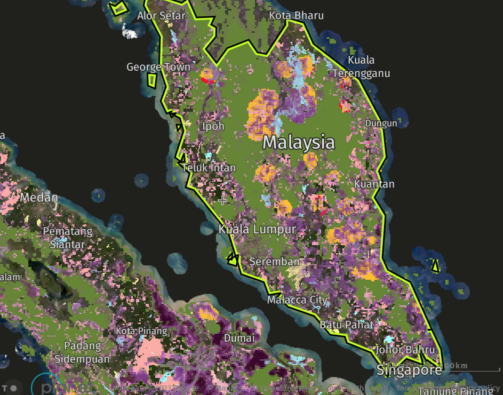
KUALA LUMPUR, Oct 19: Air quality in many parts of Malaysia continued to range from unhealthy for sensitive groups to unhealthy for people in general. The level of fine particulate matter or PM2.5 in many of these areas were also several times higher than the World Health Organization (WHO)’s set standard.
Several neighbouring countries’ cities have been also recording higher to dangerous levels of air pollution with the ongoing raging fires in parts of Indonesia. Apart from the transboundary haze brought on by the regional fires, some fires have been also reported locally including in primary forest areas based on data from the Global Forest Watch (GFW).
Meanwhile, advisories have been issued to the public on using masks and avoiding the outdoor exercising to keep a check on their health just as other contributors to the current air quality such as vehicle and industrial emissions and construction works, as well as chemical products and gases remain at work. High amounts of fine particulate matter in the air have been known to be a cause for premature deaths from cardiovascular disease, pulmonary disease and cancer.
Deforestation in some of the states in Peninsular Malaysia such as Kelantan, Pahang, Terengganu, Johor, Perak, Kedah and Selangor meanwhile have continued, reducing the help that could come towards better air quality from trees – the lungs of the earth.
The clearing of trees especially through the burn and slash methods not only raise carbon emissions and pollute the air, they also remove the protective barriers that they provide with the oxygen they produce and directly dictate air quality in their localities.
Based on the IQAir Quality map, which sources its information from the Department of Environment Malaysia, as at 7am today, the following are some of the areas that have recorded unhealthy Air Pollution Index:
- Kuala Lumpur: 156
- Klang: 182
- Pegoh, Ipoh 151
- Port Dickson 151
- Banting 159
- Shah Alam 156
- Putrajaya 155
- Petaling Jaya 159
- Cheras 152
Other areas that recorded unhealthy for sensitive groups APIs of above 100 and below 150 as of 7am today include parts of Melaka, Johor, Negeri Sembilan, Pahang and Perak. These figures will vary with rains or other mitigating factors.
Deforestation Not Helping
A check on the Global Forest Watch map meanwhile shows that deforestation has been continuing in many states in the peninsula as well as Sabah and Sarawak including in forest and protected areas year long and in the previous years, pointing towards encroachment of more lands.

The rate of greenhouse gases emissions from deforestation remains higher versus removal or the absorbtion of carbon.
In Gua Musang, Kelantan, a total of 7,980 deforestation alerts reported during the period Oct 2 to Oct 9, 2023, covering a total of 97.87 hectares with 77 hectares in primary forest areas. Elsewhere in the state, deforestation alerts covered a total of 120 hectares.
In Pahang, there were 16309 alerts in the same week, covering 200.3 hectares, covering 51 hectares in primary forest areas and close to 3 hectares in protected areas.
For the same period, Hulu Langat, Selangor, recorded 49 alerts with 0.31 hectares of them in primary forest while Shah Alam reported 151 total alerts during the week reviewed, covering 1.86 hectares of non forest areas.
Other states in the peninsula as well as Sabah and Sarawak have also recorded both hotspots or fires in forest areas as well as deforestation activities.
Malaysia in total recorded recorded 68536 GLAD-L deforestation alerts during the week, covering a total of 5.3 thousand hectares. These included forest changes in intact forests, primary forests as well as protected areas.
In the year 2022 alone, Malaysia lost 118 thousand hectares of natural forest, equivalent to 83.9 Mt of CO₂ emissions. Between 2001 and 2022, forests in Malaysia emitted 235 MtCO₂e/year, and removed -106 MtCO₂e/year, representing a net carbon source of 129 MtCO₂e/year.
While the good news is Malaysia is relatively doing more to save its rainforests, and cut its greenhouse gas emissions compared with several countries, where there has been huge amounts of tree cover loss due to fires and where fresh air has become a luxury through the combined sources with other air polluters, the country can still be more active and vigilant in monitoring its forests.
The announcement of healthy allocations by Prime Minister Datuk Seri Anwar Ibrahim in the recent Budget 2024 for conservation efforts including funding to states to keep their forest intact and the employment of more forest rangers will certainly go a long way not only in protecting the wildlife and flora and fauna but also the services the rainforests render to humankind, including cleaner air, water sources, medicinal herbs and so much more.
However, these efforts must be speedily translated into real action before more trees are destroyed hurriedly and without the benefit of an Environmental Impact Assessment (in some cases) both by domestic businesses and foreign investors promising billions of ringgit. There must must be more careful study of investments where the depletion of natural resources are inevitable in the long run.
The will to find other ways of revenue from forests be it eco tourism, or other means, must be strong, considering that the country’s rainforest is one of the oldest in the world.
–WE